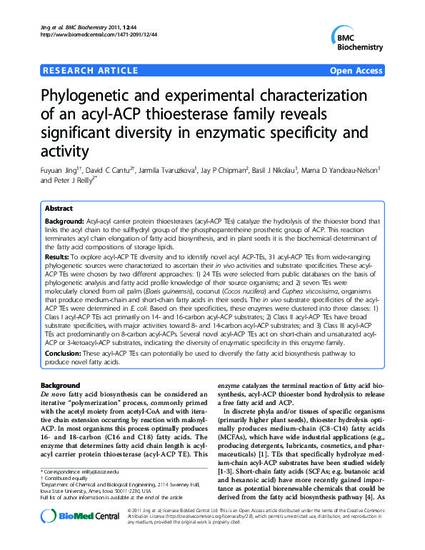
Background: Acyl-acyl carrier protein thioesterases (acyl-ACP TEs) catalyze the hydrolysis of the thioester bond that links the acyl chain to the sulfhydryl group of the phosphopantetheine prosthetic group of ACP. This reaction terminates acyl chain elongation of fatty acid biosynthesis, and in plant seeds it is the biochemical determinant of the fatty acid compositions of storage lipids.
Results: To explore acyl-ACP TE diversity and to identify novel acyl ACP-TEs, 31 acyl-ACP TEs from wide-ranging phylogenetic sources were characterized to ascertain their in vivo activities and substrate specificities. These acylACP TEs were chosen by two different approaches: 1) 24 TEs were selected from public databases on the basis of phylogenetic analysis and fatty acid profile knowledge of their source organisms; and 2) seven TEs were molecularly cloned from oil palm (Elaeis guineensis), coconut (Cocos nucifera) and Cuphea viscosissima, organisms that produce medium-chain and short-chain fatty acids in their seeds. The in vivo substrate specificities of the acylACP TEs were determined in E. coli. Based on their specificities, these enzymes were clustered into three classes: 1) Class I acyl-ACP TEs act primarily on 14- and 16-carbon acyl-ACP substrates; 2) Class II acyl-ACP TEs have broad substrate specificities, with major activities toward 8- and 14-carbon acyl-ACP substrates; and 3) Class III acyl-ACP TEs act predominantly on 8-carbon acyl-ACPs. Several novel acyl-ACP TEs act on short-chain and unsaturated acylACP or 3-ketoacyl-ACP substrates, indicating the diversity of enzymatic specificity in this enzyme family.
Conclusion: These acyl-ACP TEs can potentially be used to diversify the fatty acid biosynthesis pathway to produce novel fatty acids.
Available at: http://works.bepress.com/basil-nikolau/25/

Published in BMC Biochemistry 12 (2011): 44. doi:10.1186/1471-2091-12-44.